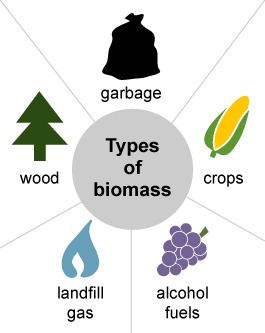Biomass energy is a renewable energy source derived from organic materials and biological matter, such as plants, agricultural and forestry residues, organic waste, and other organic sources. Biomass can be converted into usable energy through various processes, including combustion, gasification, pyrolysis, and anaerobic digestion. The energy obtained from biomass can be used for electricity generation, heating, cooling, and as transportation fuels. Here are some key aspects and applications of biomass energy: Biomass Combustion: Biomass can be burned directly as a solid fuel (wood, agricultural residues) or as biogas derived from organic waste. Combustion releases the stored energy as heat, which can be used for space heating, water heating, and industrial processes. Biogas Production: Organic waste, such as agricultural waste, food scraps, and animal manure, can undergo anaerobic digestion to produce biogas. Biogas is composed mainly of methane, which can be used as a clean-burning fuel for cooking, electricity generation, or injected into the natural gas grid. Biomass Gasification: Biomass gasification is a thermochemical process that converts biomass into syngas (a mixture of hydrogen, carbon monoxide, and other gases). Syngas can be used for electricity generation, heating, and as a feedstock for the production of biofuels and chemicals. Pyrolysis: Pyrolysis is another thermochemical process that converts biomass into biochar, bio-oil, and syngas. Bio-oil can be further refined to produce biofuels. Co-Firing: Biomass can be co-fired with coal in power plants, reducing greenhouse gas emissions and promoting the use of renewable energy in the electricity generation sector. Benefits of Biomass Energy: Renewable and Sustainable: Biomass is a renewable resource as long as it is harvested and managed sustainably. Carbon Neutrality: When biomass is burned or converted into bioenergy, it releases CO2. However, this is considered carbon-neutral as the CO2 emitted is roughly equivalent to the CO2 absorbed by the plants during growth. Waste Management: Biomass energy provides a sustainable solution for managing organic waste, reducing landfill usage, and associated environmental impacts. Energy Independence: Biomass can be sourced locally, reducing dependence on imported fossil fuels and enhancing energy security. Rural Development: Biomass energy projects can support rural development by providing employment opportunities and local economic benefits. Challenges and Considerations: Feedstock Availability: The availability and sustainability of biomass feedstock can be influenced by factors like agricultural practices, land-use changes, and competing uses for biomass. Land Use and Food Security: Large-scale biomass energy production may compete with land for food production, raising concerns about potential impacts on food security and ecosystems. Greenhouse Gas Emissions: While biomass energy is considered carbon-neutral, some conversion processes can release emissions, particularly when biomass is not sustainably sourced or when fossil fuels are used in the process. Efficiency and Technology: The efficiency of biomass energy conversion processes can vary, and some technologies may require further development to be more commercially viable. Biomass energy offers a valuable alternative to fossil fuels and plays a role in transitioning to a more sustainable and low-carbon energy system. By promoting sustainable biomass practices, investing in advanced conversion technologies, and adopting a balanced approach to biomass utilization, we can maximize the benefits of this renewable energy source while addressing potential environmental and social challenges.
